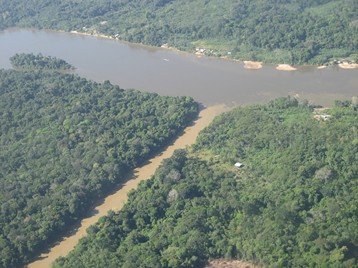Small-scale gold mining impacts river algae
29 Feb 2012
Small-scale gold mining in French Guiana is having long-term effects on diatoms, small single-celled algae, by eliminating the species that are most vulnerable to water turbidity. The findings come from research carried out by scientists from the Evolution and Biological Diversity Laboratory (Laboratoire Évolution et Diversité Biologique, CNRS / Université Paul Sabatier Toulouse III / Ecole nationale de formation agronomique) at current or former gold-mining sites located in the Nouragues Nature Reserve.
The work, published in the journal Ecological Indicators dated March 2012, aims to help create new biological indices that could be used to assess the state of rivers in the Amazon basin.
French Guiana is experiencing a genuine gold rush: the number of illegal gold-mining sites is estimated at between 500 and 900. According to France's National Forestry Office, over 1,300 kilometers of rivers and 12,000 hectares of forest are directly affected by this activity. It is well known that gold mining has a negative impact on the environment due to the release of mercury into rivers. However, the ecological impact of increased water turbidity caused by gold mining is little known.
To better understand one of its aspects, the researchers decided to study populations of diatoms, single-celled algae measuring between 2 µm and 1 mm. They examined diatom communities at 10 currently or recently exploited gold-mining sites and in model rivers never exploited by gold miners. By brushing stones and pieces of wood to which diatoms attach, the researchers were able to compare the populations present in these various locations of the Approuague basin.
The analysis showed that mining activity had a major impact on these communities. At gold-mining sites, the proportion of certain species had increased to the detriment of others. The reasons for this are functional: some diatoms are firmly attached to the substrate, whereas others are able to move around on its surface. The latter are far more resistant to the impact of gold mining.
 |
| Confluence of a watercourse showing high turbidity caused by intense gold mining. © Kamran Khazraie |
According to the researchers, the impact of water turbidity can be explained in two ways. On the one hand, in cloudy water, less light gets through to the algae, which leads to a reduction in primary production. And on the other hand, the sediment stirred up by the gold miners gradually settles on the algae, asphyxiating them. That is why moving diatoms are more resistant: they can rise above the layer of sediment as it starts covering them. In addition, the researchers did not observe any deformation of the siliceous skeletons of the diatoms. Such deformations only appear when there is high mercury contamination.
In addition to determining the impact of gold mining on communities of algae, the research sought to contribute to the development of new biological indicators to assess and monitor the health of ecosystems in French Guiana's rivers.
While diatoms are a widely used indicator in European rivers, using them in the Amazon requires a good grasp of the specific dynamics of local populations and their reaction to human-induced disturbance.
The researchers are also looking at other bioindicators such as fish, crustaceans and aquatic insect larvae. Having completed their work in the Approuague basin and, more recently, the Maroni basin, the scientists will continue to study such sentinel species in the Oyapock basin.


















